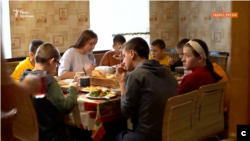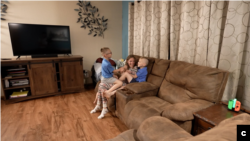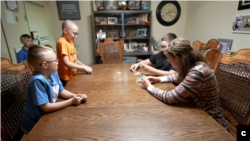A family from the USA adopted a Ukrainian girl who survived the occupation, abduction by the Russians and captivity
[ad_1]
Nick and Bethany were desperate for a way to get their daughter out. In the course of the search, they met two American volunteers, former military personnel, who helped evacuate people from the first days of the war in Ukraine.
One of them, Katie Stickel, told Voice of America that she started looking for children from Novopetrivka only because one of the girls, Yulia, was adopted by the Americans.
“The only reason we knew these children existed was because one child from this orphanage was adopted by Americans. And this mother, Bethany White from Gillette, Wyoming, started looking for help. She called the International Red Cross (they never help , I’ll tell you straight.) She called everyone she could think of. No one could help. Then she remembered that there was a lady in their church who had gone to Ukraine six years ago, and she called her, that was my partner Ashley. That’s how we started looking for these children,” said American volunteer Katie Stickel.
At that time, Katie and Ashley were already working in Kherson. At first, they tried to take the children out of the occupation. The local community of Russian-speaking Ukrainian Muslims helped them in their search.
“I was in Kherson, when I helped in the evacuation, I met a group of guys there who are Muslims, but Ukrainian citizens. And because they do not look like Ukrainians, the Russians did not pay much attention to them. So all these men – whose names are Ahmet, Mehmet and so on – they became my friends, and they all lived around the area where the boarding school was located, so I wrote to them sometimes: hey, Mehmet, could you check Novopetrivka, what’s their situation, is it possible to take them out? He then wrote to all his friends, they climbed onto the roofs of their houses, and he then wrote back to me: “Oh, no, it won’t work today, they are shooting. They have soldiers on trees in the forest, shooting at every car that leaves,” recalls the former US Army soldier.
Nataliya Lutsik, the director of a special school from Novopetrivka, says that she did not have time to take the children out when the invasion began. And for six months they lived in the basement – the director herself, her husband, the boarding school driver, and 15 children with special needs from 8 to 17 years old.
“We lived without electricity and water for 5 months, we collected rainwater. They say: Nataliya Volodymyrivna, we will now teach everyone how to bathe, wash, wash things and water flowers with a handful of water,” – the former director of the boarding school told Voice of America .
When children remember this period, their voices tremble. When asked if it was difficult in the basement, Yuliya remembers only one case, when three of her friends who went out for a walk were killed.
“Three of our girls were killed by the Russians in Ukraine. Vika was hit in the head. We heard a sound. They were walking on the street, and we heard someone shouting “oh, it hurts, it hit the back”. There were six girls there, three are still alive. Vika, Lena, Sveta – 13, 15 and 16 h – they are gone,” says 17-year-old Yulia.
According to volunteer Katie, the Russians knew about the children in the basement of the special school, and when the ZSU began their offensive, the children were forcibly removed from the city. The principal and her husband jumped into the bus with the children.
Katya Sickel: “In August, the children were forcibly removed from the orphanage. They were transported to Kherson at gunpoint, for us this meant that they were still under a deeper occupation. Then in October, they were taken to Crimea, then through Crimea to Russia, to Krasnodar.” .
Director Nataliya Lutsyk talked with the children in advance about their actions for all possible scenarios: “They had to know, even if there was shelling, who they would go to from among the workers, where they could hide. Then, if they separated us, what should they do. And when we were already on our way to Crimea, the first thing I said to them was: Children, Crimea is Ukraine, we are still in Ukraine.”
When they realized that they were being taken from Crimea to Russia, Natalia remembers how she and her husband broke down in tears.
“And only later, when we knew where we were going, I said: “Children, remember, we will never leave you. We are going to Russia. But we will leave, and I will do everything so that we leave. … And remember, you are almost an adult, you still have four years left, you still have two years left, but you will have the right, even with a Russian passport, to leave this country,” says Ms. Lutsyk.
The former director continues: “Nazar and Kolya were the youngest. I tell them: Nazar, you are 10 years old, Kolya, you have 8 more years to wait. And they will take you away. This is in case we are separated.”
They were brought to Krasnodar, where they were placed in a camp, at that time there were already about half a thousand children there, the teacher says.
“The children were crying, they wanted to go home, but they explained that they just wanted to go home,” recalls the former director of the boarding school.
Their life in the camp was similar to being in a Soviet children’s camp, there were counselors, sports games and children’s discos.
Natalia Lutsyk: “They [росіяни] did not understand why children do not dance at the disco. A counselor came to me and said: why don’t your children dance? They did not understand that we have no joy.”
Yulia recalls that they were not beaten or taken to interrogations in the camp. However, he says, everyone was scared: “Yes, it was very scary. … Russians are not our people.”
They [росіяни] did not understand why children do not dance at the disco. A counselor came to me and said: why don’t your children dance? They did not understand that we have no joy.
And Mrs. Nataliya recalls an incident when children, with fear of being caught, brought yellow and blue cookies to her room.
“My children carried me a yellow and a blue heart, on different floors. They ran and connected the two hearts only in my room so that no one would see, imagine. They ran to me like that, because it was impossible. You understand ?” – says Mrs. Natalia.
In Russia, she allowed children to do things that were never allowed in a boarding school.
“Forgive me to say so, but I let them, when we were there, when it was delicious, to lick the plates, when the bread appeared, we kissed it and cried, and today no child will leave a piece of bread, it is a crumb he will pick it up from the table with his fingers,” Nataliya Lutsyk says.
Meanwhile, Katie and Ashley continued their search for children. It took them several weeks. In liberation they were helped by … local residents of Russia.
“The local Russians helped us get information and get these kids out. And I don’t care why they did it. If they did it to whitewash themselves in a war crimes investigation, so be it, but they helped us. A lot of them are very religious and perceive everyone as God’s children. And I didn’t care what flag they were helping us under,” said Kati Sickel, a former US soldier.
The children managed to be taken secretly out of the camp only on the second attempt. Exactly how – the volunteers do not tell. He said that many people remain in captivity now, and they are working on their release. But 15 children and their teacher were able to leave Russia.
Katie and Ashley met them at the Georgian border.
“The day we took them out of Russia, it was the middle of November. Of the 15 children, none of them had normal shoes on their feet, they had no coats, and they were very thin. I will not say that they were starving, they they were just very pale,” Katie recalls.
In Georgia, volunteers rented a house for a group of children, money for housing, clothes and food was collected from donations. The children started a new life.
“It’s great here, there is electricity, water, all amenities,” Lilya from the special school shared in an interview with the Voice of America.
Her friend Dasha adds: “I like it in Georgia, it’s cool here, the mountains, we’ve only seen them in pictures, but it’s so beautiful here, there’s also snow. … Today we took the metro for the first time, to a drawing class. We were told that we can become artists. But we would all like to go to Ukraine, that’s 100 percent.”
In Georgia, children’s documents are being restored. Yuliya, who has already been adopted, will live here for a few more months until she can go abroad.
Her adoptive mother, Bethany, came from the United States to Georgia before the New Year and stayed with the children for five and a half weeks while her daughter’s documents needed to leave the country were renewed.
So, at the beginning of 2023, more than three years after the adoption began, Yulia got to her new home in the American state of Wyoming, where four brothers – the biological children of Bethany and Nick – and an adopted sister from Ukraine, who at that time were waiting for her lived in the USA for almost a year.
Now Julia is learning English and already goes to a local school. He communicates with parents, brothers and classmates through an electronic translator.
The girl admits that learning English is difficult, but the school provided her with a computer that helps her translate and do homework.
“We have a computer where we are given tasks and we do them. We chat with our friends through a translator,” shares Yulia.
Relations with my sister from Ukraine did not work out. Julia says that they have different personalities.
Valeria, Yuli’s adopted sister, has no desire to learn English and is waiting for her coming of age to leave her adopted family.
“My family never had what I have now, but how can I tell you? I don’t hide it, I can drink and smoke. If my mother tells me “don’t drink, don’t smoke”, I still will I do it because I like it. I don’t learn English, only what I learn at school. I like my language and I don’t want to learn any more languages,” says the Russian-speaking Lyera.
“I plan to leave here for another state: to New York or Los Angeles, where there are more Russian speakers, I will be able to speak with them. I don’t want to be here,” adds Lera. Yulia has developed warmer relations with her American brothers. They walk together after school on the street, play board games, sing songs with their musician dad.
Julia even taught the brothers a few Ukrainian words.
“Mug, dog, ne and ta”, – the eldest of Mike’s brothers shares his Ukrainian vocabulary.
“At first I was a little jealous of my parents for the girls, but now I realize that I have nothing to worry about. I was worried that I would no longer be the oldest child in the family, but it does not matter, because I am still the oldest boy in the family. “, – said Maika White, Yulia’s adopted brother.
Learning to live in a family is not easy. However, within a few months of her new life, Julia already knows what her favorite activities are with her new family: “I like to go to the store with my family, I like to go to church together, and I like food, my parents cook delicious food.”
Her parents admit: life with adopted children is a test. But at the same time, they assure that the girls brought more joy to the house.
Nick White, Julia’s adoptive father: “There are challenges that come with being a teenager. But it’s actually better than I expected. I thought it was going to be chaos. Those challenges and how we get through them together, I think, makes me a better person”.
Bethany recalls the first meeting with Yulia in Ukraine, and assures that she will do everything possible to improve her daughter’s life.
“When we first arrived at the orphanage in Ukraine, we were immediately taken to a room to meet the child. She was very nervous and started to cry a lot. The director of the orphanage tried to calm her down, asked what happened, why she was crying. And she said then that excited because she’s been waiting so long,” her mother, Bethany White, recalls.
In the evenings, they glorify God with music and thank fate for joyful chaos and a large family.
[ad_2]
Original Source Link











